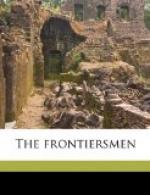Once more silence, save for the patrol of the wind again on its rounds. Once more the flare of the fire, dying gradually down to a smouldering red glow, akin to the smothered red tone of the terra-cotta wall. Once more the hot, angry eyes of the young war-captain, staring hopelessly, sleeplessly into the red gloom and the dull mischance of the future, sequel of the past.
Suddenly a thought struck him. It seemed at first to take his breath away. He gasped at the mere suggestion of its temerity. Then it set his blood beating furiously in his veins. After a space, in which he sought to calm himself, to still his nerves, to tame his quivering muscles, he rose slowly to a sitting posture, then stepped deftly, lightly to the floor. Standing motionless, he glanced keenly about in the dull red gloom. All silence—no stir save the regular rise and fall of the breathing of the slumbering Indians. Nevertheless, with his keen perceptions all alert and tense, he felt an eye upon him. He looked back warily over his shoulder through the lucid red gloom, like a palpable medium, as one looks, through a veil or tinted glass.
It was the eye of the dog! The animal lay under the couch, his muzzle flat on the clay floor. A serious yet doubtful vigilance was in his aspect. Tscholens was already at the exit, which was a narrow winding passage serving as a wind-break, and with a sudden turn leading to the outer world. He heard the abrupt patter of the dog’s feet on the clay floor, and a drowsy voice calling to the animal in Cherokee, admonishing him to be still. Tscholens waited without, and, as the dog issued and with half-aroused suspicions sniffed dubiously around him, he stooped down and patted the creature’s head. It was well, after all, that he should follow; the noise of the dog’s exit and return would serve to cover his own absence.
He sought craftily to make friends with the dog. “Mon chou! Mon cochon!” he said, aping the endearments addressed to dog or horse which he had heard from the French officers at Fort Chartres, where he had recently been. Then suddenly in agitation: “Tais toi! Sois sage!”
For the animal was indeed no Cherokee. At the sound of his native tongue, as it were, he demonstrated how little he cared to be in his skin, for his joyous bounces almost took him out of that integument. Luckily his gambols were noiseless,—for the ground was covered with snow.
Tscholens stood for a moment motionless, his brain still afire with the imminent emprise, but his hot heart turning cold, and failing; for the snow—oh, treacherous cloud!—the snow would betray his steps and the trail disclose the mystery.




